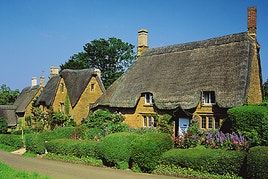England, because it is the largest of the four countries, acts as the industrial and trading center of the United Kingdom of Great Britain and Northern Ireland. London remains the capital and largest city of England.

The government of England, both a parliamentary democracy and constitutional monarchy, serves as the government for the entire UK. The Parliament, the chief lawmaking body of UK, consists of the monarch, and the Cabinet (senior members of Parliament, led by Prime Minister) governs the UK.
The Royal Family

Prime Minister Boris Johnson

England has a mixture of city and rural living. Because of the Industrial Revolution, about 80% of people came to live in cities for work and left the countryside and today, 95% of people live in urban areas.
London

English Country Cottage

Information from World Book Online

Joseph Mallord William Turner, 1775 - 1851. 1844. Rain, Steam, and Speed - The Great Western Railway. Place: The National Gallery, London, Turner Bequest, 1856. https://library.artstor.org/asset/ANGLIG_10313768662.

George Lambert, 1700-1765, British. 1747. Kirkstall Abbey, Yorkshire. Painting, landscape. Place: Yale Center for British Art, Paul Mellon Collection. https://library.artstor.org/asset/AYCBAIG_10313605267.

Beardsley, Aubrey, 1872-1898. March 1893. How King Arthur saw the Questing Beast.
https://library.artstor.org/asset/ARTSTOR_103_41822001001138.

Thomas Luny, 1759-1837, British. 1780. A Packet Boat Under Sail in a Breeze off the South Foreland. Painting, marine art. Place: Yale Center for British Art, Paul Mellon Collection. https://library.artstor.org/asset/AYCBAIG_10313608519.

Carol Ann Duffy is a British poet and playwright. With numerous collections of poetry, books, and plays to her name she also served as Poet Laureate of the United Kingdom from 2009 to 2019 and is the first openly LGBT woman to hold the position. She is professor of contemporary poetry at Manchester Metropolitan University.
The British Invasion sparked the creative elements within rock music and later earned respect as a legitimate art form. Rock blossomed into many new styles and sounds. By the mid-1960’s, rock music had become the dominant form of popular music. Some notable British musicians during this era include: David Bowie, Elton John, Led Zeppelin, Pink Floyd, Sex Pistols, and the Kinks. In the 70s, a new wave of musicians such as, The Cure and Talking Heads. Music listeners can trace the developments of British bands, like the Beatles, in the advancements of music throughout decades.
The Beatles brought the rebirth of rock n' roll to the United States and sparked the emergence of many British rock bands on the American charts of best selling records. The Beatles, from Liverpool, were inspired by the early 1950s rock in American and rebranded this style to create instant success in the next decade. The members include George Harrison on lead guitar, Ringo Star on drums, and John Lennon on rhythmic guitar while also wrote and sang songs with Paul McCartney. A note on the Beatles music from World Book Online includes that "during the middle and late 1960's, the Beatles helped to give rock music a new direction. Most earlier rock music had been based primarily on a strong beat, but the Beatles' music contained a new sense of melody. Their chord progressions were also more complex, and the lyrics of their songs were more imaginative and meaningful. The Beatles composed several songs of social criticism, including "Nowhere Man" (1965) and "Revolution" (1968). They also wrote such ballads as "Michelle" (1965) and "Yesterday" (1965). Other popular Beatles' songs included "Strawberry Fields Forever" (1967), "Hey, Jude" (1968), "Come Together" (1969), and "Something" (1969). The Beatles won an Academy Award in 1970 for the title song from Let It Be, a documentary motion picture about the group in a recording studio." The Beatles were inducted into the Rock and Roll Hall of Fame in 1988 and won several Grammy Awards for the continued success.


The Rolling Stones also proved to be an important band in the British invasion. World Book Online states that "the Rolling Stones formed in London in 1962. The quintet was led by singer Mick Jagger. Jagger and guitarist Keith Richards formed a songwriting partnership. Their aggressive, rebellious style can be heard in such rock classics as “(I Can’t Get No) Satisfaction” (1965), “Sympathy for the Devil” (1968), and “Honky Tonk Women” (1969). The Stones rank among the most enduring rock groups. The band, still led by Jagger and Richards, continued to perform into the 2000’s."


The Who, similar to the Rolling Stones, was a popular British Band that expressed the dissatisfaction of young people. Pete Townshend, the guitarist and songwriter for the band, wrote “My Generation” (1965) is a classic rock expression of youthful alienation. The Who created the first successful rock opera titled Tommy (1969). It was also made into a motion picture in 1975 and was produced on Broadway in 1993.


